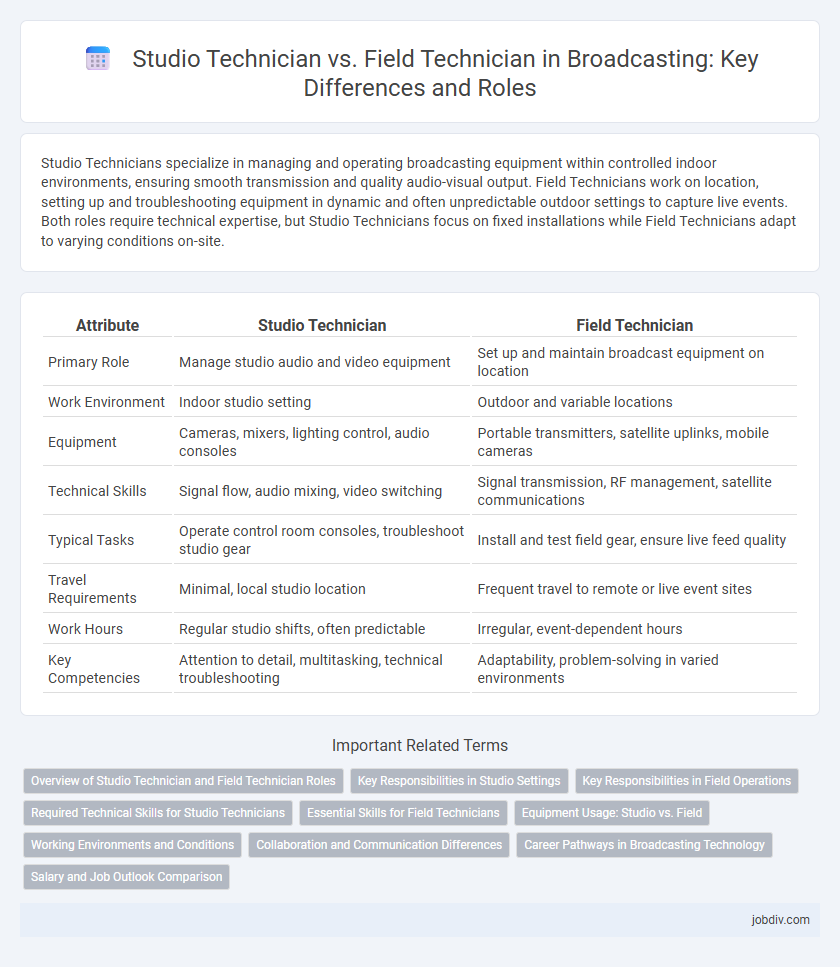Studio Technicians specialize in managing and operating broadcasting equipment within controlled indoor environments, ensuring smooth transmission and quality audio-visual output. Field Technicians work on location, setting up and troubleshooting equipment in dynamic and often unpredictable outdoor settings to capture live events. Both roles require technical expertise, but Studio Technicians focus on fixed installations while Field Technicians adapt to varying conditions on-site.
Table of Comparison
| Attribute | Studio Technician | Field Technician |
|---|---|---|
| Primary Role | Manage studio audio and video equipment | Set up and maintain broadcast equipment on location |
| Work Environment | Indoor studio setting | Outdoor and variable locations |
| Equipment | Cameras, mixers, lighting control, audio consoles | Portable transmitters, satellite uplinks, mobile cameras |
| Technical Skills | Signal flow, audio mixing, video switching | Signal transmission, RF management, satellite communications |
| Typical Tasks | Operate control room consoles, troubleshoot studio gear | Install and test field gear, ensure live feed quality |
| Travel Requirements | Minimal, local studio location | Frequent travel to remote or live event sites |
| Work Hours | Regular studio shifts, often predictable | Irregular, event-dependent hours |
| Key Competencies | Attention to detail, multitasking, technical troubleshooting | Adaptability, problem-solving in varied environments |
Overview of Studio Technician and Field Technician Roles
Studio technicians manage complex audio and video equipment within controlled environments to ensure seamless production quality. Field technicians operate on location, handling setup, troubleshooting, and live broadcast challenges under variable conditions. Both roles require technical expertise but differ primarily in work settings and immediate problem-solving demands.
Key Responsibilities in Studio Settings
Studio Technicians manage audio and video equipment within controlled environments, ensuring seamless live broadcasts and high-quality recording sessions. They handle camera operations, lighting adjustments, and audio mixing to maintain optimal studio production standards. Their expertise in troubleshooting in-studio technical issues is crucial for minimizing downtime and maintaining broadcast integrity.
Key Responsibilities in Field Operations
Field Technicians specialize in on-site setup, maintenance, and troubleshooting of broadcasting equipment, ensuring seamless live transmissions in diverse environments. They handle satellite links, remote cameras, and mobile broadcast units while adapting to varying technical and logistical challenges in outdoor or event locations. Their key responsibilities include real-time problem resolution, equipment calibration, and coordinating with broadcast centers to maintain signal integrity during live field operations.
Required Technical Skills for Studio Technicians
Studio Technicians require expertise in operating and maintaining broadcast equipment such as video switchers, audio mixers, and lighting control systems within a controlled environment. Proficiency in troubleshooting AV signal flows, configuring broadcast software, and ensuring seamless live production quality is essential. Familiarity with ANSI and SMPTE broadcast standards ensures compliance and optimal performance during studio operations.
Essential Skills for Field Technicians
Field technicians in broadcasting excel in troubleshooting live broadcast equipment under varied environmental conditions, mastering satellite links, RF transmission, and wireless communication tools. They require advanced skills in signal flow analysis, portable audio/video system setup, and rapid repair techniques to ensure uninterrupted transmission during remote broadcasts. Proficiency in network connectivity and familiarity with broadcast standards like HD-SDI and IP streaming protocols are essential for maintaining seamless field operations.
Equipment Usage: Studio vs. Field
Studio Technicians operate advanced broadcast equipment such as audio mixers, video switchers, and lighting control panels within controlled environments, ensuring high-quality production. Field Technicians manage portable gear including ENG cameras, wireless microphones, and satellite uplink systems, adapting to variable and often unpredictable outdoor settings. Understanding the distinct technical requirements and equipment capabilities is critical for optimizing broadcast performance in studio versus field scenarios.
Working Environments and Conditions
Studio technicians primarily work in controlled indoor environments such as television studios or radio stations, where lighting, sound, and equipment setups are stable and predictable. Field technicians operate in diverse outdoor or on-location settings, often facing variable weather conditions, unpredictable lighting, and the need for portable equipment setup. The contrast in work environments requires studio technicians to focus on precision and calibration, while field technicians must prioritize adaptability and equipment durability.
Collaboration and Communication Differences
Studio technicians coordinate closely with producers and talent within controlled environments, ensuring seamless operation of broadcast equipment through real-time communication via intercom systems. Field technicians operate remotely, relying heavily on mobile communication devices and satellite links to troubleshoot and adapt to unpredictable on-site conditions. Collaborative workflows differ as studio teams benefit from immediate, face-to-face interactions, while field technicians depend on clear, concise reporting and digital communication tools to maintain alignment with central studios.
Career Pathways in Broadcasting Technology
Studio technicians specialize in operating and maintaining in-house broadcast equipment, ensuring smooth production within controlled environments, while field technicians manage on-site setups and troubleshoot technical issues during live events or remote broadcasts. Career pathways for studio technicians often lead to roles like broadcast engineer or production manager, emphasizing equipment expertise and studio operations, whereas field technicians progress toward roles such as remote production supervisor or technical director, focusing on versatile problem-solving and mobile broadcast technology. Both career tracks require proficiency in audio-visual systems, signal flow, and broadcast standards, with specialization influencing advancement within the broadcasting technology sector.
Salary and Job Outlook Comparison
Studio technicians typically earn an average salary ranging from $40,000 to $60,000 annually, with opportunities concentrated in urban broadcasting hubs. Field technicians, who travel to various locations for live event setups and equipment maintenance, usually see salaries between $35,000 and $55,000 but benefit from growing demand driven by expanding live broadcasts and remote productions. Job outlooks for both positions indicate steady growth, with field technicians experiencing a slightly higher increase due to the rise in on-site media production and technological advancements.
Studio Technician vs Field Technician Infographic

 jobdiv.com
jobdiv.com